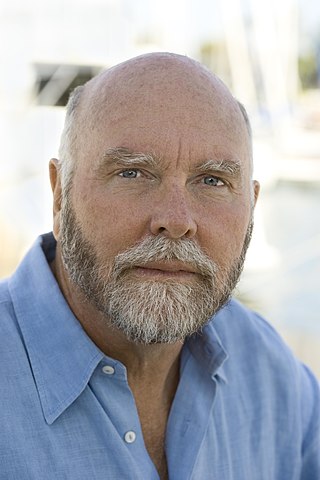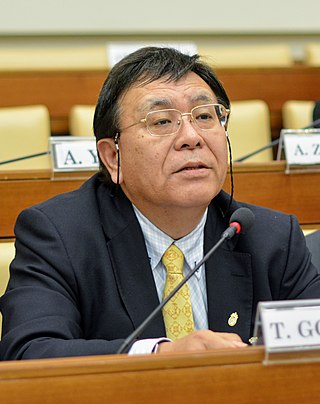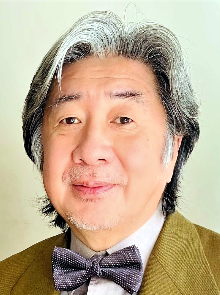Related Research Articles

John Craig Venter is an American biotechnologist and businessman. He is known for leading one of the first draft sequences of the human genome and assembled the first team to transfect a cell with a synthetic chromosome. Venter founded Celera Genomics, the Institute for Genomic Research (TIGR) and the J. Craig Venter Institute (JCVI). He was the co-founder of Human Longevity Inc. and Synthetic Genomics. He was listed on Time magazine's 2007 and 2008 Time 100 list of the most influential people in the world. In 2010, the British magazine New Statesman listed Craig Venter at 14th in the list of "The World's 50 Most Influential Figures 2010". In 2012, Venter was honored with Dan David Prize for his contribution to genome research. He was elected to the American Philosophical Society in 2013. He is a member of the USA Science and Engineering Festival's advisory board.
Riken is a national scientific research institute in Japan. Founded in 1917, it now has about 3,000 scientists on seven campuses across Japan, including the main site at Wakō, Saitama Prefecture, on the outskirts of Tokyo. Riken is a Designated National Research and Development Institute, and was formerly an Independent Administrative Institution.

Takashi Gojobori is a Japanese molecular biologist, Vice-Director of the National Institute of Genetics (NIG) and the DNA Data Bank of Japan (DDBJ) at NIG, in Mishima, Japan. Gojobori is a Distinguished Professor at King Abdullah University of Science and Technology (KAUST) in Thuwal, Saudi Arabia. He is a Professor of Bioscience and Acting Director at the Computational Bioscience Research Center at KAUST.
Yasunori Hayashi is a Japanese neuroscientist who was born in Aichi and grew up in Tokyo. He leads a research group at the RIKEN Brain Science Institute, Japan.
Samir Kumar Brahmachari is an Indian biophysicist and Former Director General of the Council of Scientific & Industrial Research (CSIR) and Former Secretary, Department of Scientific and Industrial Research (DSIR), Government of India. He is the Founder Director of Institute of Genomics and Integrative Biology (IGIB), New Delhi and the Chief Mentor of Open Source for Drug Discovery (OSDD) Project. He is the recipient of J.C Bose Fellowship Award, DST (2012). In addition, he is one of the featured researchers in the India Cancer Research Database developed by Institute of Bioinformatics (IOB), Bangalore with support from the Department of Biotechnology, Government of India.
Yamazaki-Teiichi Prize is an award given annually by the Foundation for Promotion of Material Science and Technology of Japan (MST) to people who have achieved outstanding, creative results, with practical effect, by publishing theses, acquiring patents, or developing methods, technologies and the like and/or people with strong future potential for achieving such results. Chairman of the selection committee is Professor Hideki Shirakawa, the winner of the 2000 Nobel Prize in chemistry. The prize was established in commemoration of the late Teiichi Yamazaki, the first chairman of the MST's Board of Directors, for his contributions to scientific, technological and industrial development and human resource cultivation.
John Quackenbush is an American computational biologist and genome scientist. He is a professor of biostatistics and computational biology and a professor of cancer biology at the Dana–Farber Cancer Institute (DFCI), as well as the director of its Center for Cancer Computational Biology (CCCB). Quackenbush also holds an appointment as a professor of computational biology and bioinformatics in the Department of Biostatistics at the Harvard School of Public Health.
Ronald Wayne "Ron" Davis is professor of biochemistry and genetics, and director of the Stanford Genome Technology Center at Stanford University. Davis is a researcher in biotechnology and molecular genetics, particularly active in human and yeast genomics and the development of new technologies in genomics, with over 30 biotechnology patents. In 2013, it was said of Davis that "A substantial number of the major genetic advances of the past 20 years can be traced back to Davis in some way." Since his son fell severely ill with myalgic encephalomyelitis/chronic fatigue syndrome Davis has focused his research efforts into the illness.
Asian Scientist is an English language science and technology magazine published in Singapore.

Dr. Krishnaswamy VijayRaghavan is an emeritus professor and former director of the National Centre for Biological Sciences. On 26 March 2018, the Government of India appointed him as the principal scientific adviser to succeed Dr. R Chidamabaram. His term as Principal Scientific Adviser ended on April 2, 2022. In 2012, he was elected a fellow of The Royal Society and in April 2014 he was elected as a foreign associate of the US National Academy of Sciences. He was conferred the Padma Shri on 26 January 2013 and is also a recipient of the Infosys Prize in the life sciences category in 2009.

Jennifer Anne Doudna is an American biochemist who has done pioneering work in CRISPR gene editing, and made other fundamental contributions in biochemistry and genetics. Doudna was one of the first women to share a Nobel in the sciences. She received the 2020 Nobel Prize in Chemistry, with Emmanuelle Charpentier, "for the development of a method for genome editing." She is the Li Ka Shing Chancellor's Chair Professor in the department of chemistry and the department of molecular and cell biology at the University of California, Berkeley. She has been an investigator with the Howard Hughes Medical Institute since 1997.

Yoshiki Sasai was a Japanese stem cell biologist. He developed methods to guide human embryonic stem cells (hESCs) into forming brain cortex, eyes, and other organs in tissue culture. Sasai worked at the Riken Center for Developmental Biology (CDB) in Kobe, and was Director of the Laboratory for Organogenesis and Neurogenesis. Following his involvement in the 2014 STAP cell controversy, Sasai was found dead at Riken from an apparent suicide.
Stimulus-triggered acquisition of pluripotency (STAP) was a proposed method of generating pluripotent stem cells by subjecting ordinary cells to certain types of stress, such as the application of a bacterial toxin, submersion in a weak acid, or physical trauma. The technique gained prominence in January 2014 when research by Haruko Obokata et al. was published in Nature. Over the following months, all scientists who tried to duplicate her results failed, and suspicion arose that Obokata's results were due to error or fraud. An investigation by her employer, RIKEN, was launched. On April 1, 2014, RIKEN concluded that Obokata had falsified data to obtain her results. On June 4, 2014, Obokata agreed to retract the papers. On August 5, 2014, Yoshiki Sasai—Obokata's supervisor at RIKEN and one of the coauthors on the STAP cell papers—was found dead at a RIKEN facility after an apparent suicide by hanging.

Yusuke Nakamura is a Japanese prominent geneticist and cancer researcher best known for developing Genome-Wide Association Study (GWAS). He is one of the world's pioneers in applying genetic variations and whole genome sequencing, leading the research field of personalized medicine.

Yoshinori TokuraForMemRS is a Japanese physicist, Professor at University of Tokyo and Director of Center for Emergent Matter Science (CEMS) at RIKEN. He is a specialist in physics of strongly correlated electron systems and known for his work in high-temperature superconductivity, Mott transition, colossal magnetoresistance, Multiferroics, and magnetic skyrmions.

Jaw-Shen Tsai is a Taiwanese physicist. He is a professor at the Tokyo University of Science and a team leader of the Superconducting Quantum Simulation Research Team at the Center for Emergent Matter Science (CEMS) within RIKEN. He has contributed to the area of condensed matter physics in both its fundamental physical aspects and its technological applications. He has recently been working on experiments connected to quantum coherence in Josephson systems. In February 2014, he retired from NEC Corporation, after 31 years of employment. He is a fellow of the American Physical Society as well as the Japan Society of Applied Physics.

FANTOM is an international research consortium first established in 2000 as part of the RIKEN research institute in Japan. The original meeting gathered international scientists from diverse backgrounds to help annotate the function of mouse cDNA clones generated by the Hayashizaki group. Since the initial FANTOM1 effort, the consortium has released multiple projects that look to understand the mechanisms governing the regulation of mammalian genomes. Their work has generated a large collection of shared data and helped advance biochemical and bioinformatic methodologies in genomics research.

Fugaku(Japanese: 富岳) is a petascale supercomputer at the Riken Center for Computational Science in Kobe, Japan. It started development in 2014 as the successor to the K computer and made its debut in 2020. It is named after an alternative name for Mount Fuji.
Emiko Hiyama is a Japanese computational nuclear physicist whose research concerns computational methods for few-body systems of nucleons. She is the director of the Strangeness Nuclear Physics Laboratory at the Riken Nishina Center for Accelerator-Based Science, and a professor of physics at Tohoku University.
References
- ↑ "Piero Carninci". SISSA. Retrieved April 23, 2019.
- ↑ "Piero Carninci". Archived from the original on April 29, 2013. Retrieved December 21, 2013.
- ↑ "Piero Carninci's CV" (PDF). Retrieved April 23, 2019.
- ↑ "Piero Carninci received Shimadzu Prize" . Retrieved April 23, 2019.
- ↑ adminstandard (2020-11-16). "Leaders of Genomics Research Centre announced". Human Technopole. Retrieved 2023-04-05.